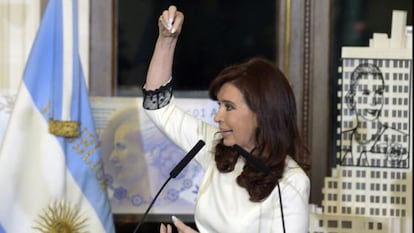Argentina refuses to recognize default status
Judge Thomas Griesa orders the parties to hold further negotiations


According to credit rating agency Standard and Poor’s, Argentina went into “selective default” on Wednesday July 30. The country is considered to be in partial default because it was unable to honor some of its sovereign debt obligations. The international credit rating agency Fitch called the country’s status “restricted default.” The Argentinean government, however, denies all these labels.
On Thursday afternoon, Economy Minister Axel Kicillof said Argentina’s supposed default is “nonsense.” Hours before, cabinet chief Jorge Capitanich told reporters at an intimidating press conference that “to say Argentina is actually in default is total bunk.” Capitanich said the government has paid and will continue to pay what it owes Repsol and the Paris Club. On Monday, Argentina paid $642 million on its debt to the group of creditors.
Economy Minister Axel Kicillof said Argentina’s supposed default was “nonsense”
But some of the country’s “bondholders of good faith,” those who accepted exchange bonds in 2002, did not receive $539 million in payments by Wednesday, July 30. The government deposited the sum at the Bank of New York Mellon on July 26. But Judge Thomas Griesa, who is presiding over this contentious court battle between Argentina and the “vulture funds,” embargoed the money. These creditors cannot collect until Argentina delivers $1.5 billion to Aurelius and NML Capital, two of its holdout investors. They refused to accept payment at a discount rate in 2005 and in 2010 after Argentina restructured its sovereign debt. They demand full payment.
In a televised speech on Thursday night, President Cristina Fernández said there was “no such thing as selective default.” She reiterated her point of view and tried to play down the issue. “The world keeps moving and so does Argentina,” she said. She told the press that 100 American academics had asked the United States Congress to intervene in the matter and overturn Griesa’s ruling. She assured Argentineans that the country was still solvent and urged them to stand together.
Fernández, Kicillof and Capitanich accused Judge Griesa of partiality. The president even criticized the Argentinean bankers who tried to broker a deal with the “vulture funds.” She said they were not “heroes” and asked them not to deceive the nation. Fernández made it clear that she had no intention of complying with the court ruling that ordered Argentina to pay $1.5 billion to the litigant investment funds. But the Bank of New York Mellon has complied with Griesa’s sentence.
President Fernández de Kirchner assured Argentineans that the country was still solvent and urged them to stand together
On Thursday, New York Mellon published a statement saying “these funds are subject to a court ruling.” The bank “has no obligation to do anything which may be illegal or contrary to applicable law or regulation or cause it to expend or risk its own funds or otherwise incur any liability in the performance of any of its duties or in the exercise of any of its rights, powers or discretions.” In principle, bondholders who did not receive due payment on July 30 could rescind on their agreement on the exchange offers and declare full payments “immediately due and payable” in a process known as acceleration.
A key factor in determining the impact of this so-called “selective default,” or “monstrosity” as Economy Minister Kicillof calls it, will be whether Argentina’s situation triggers Credit Default Swaps (CDS). Meanwhile, Judge Griesa ordered both parties to attend a court hearing at 11am on Friday morning in New York. Aurelius and NML Capital are expected to be present.
In Buenos Aires, the stock market fell by 7.6%. The country’s risk premium score climbed 13.9% to 622 basic points and its bonds fell by between 4.4% and 7%.
Translation: Dyane Jean François
Tu suscripción se está usando en otro dispositivo
¿Quieres añadir otro usuario a tu suscripción?
Si continúas leyendo en este dispositivo, no se podrá leer en el otro.
FlechaTu suscripción se está usando en otro dispositivo y solo puedes acceder a EL PAÍS desde un dispositivo a la vez.
Si quieres compartir tu cuenta, cambia tu suscripción a la modalidad Premium, así podrás añadir otro usuario. Cada uno accederá con su propia cuenta de email, lo que os permitirá personalizar vuestra experiencia en EL PAÍS.
En el caso de no saber quién está usando tu cuenta, te recomendamos cambiar tu contraseña aquí.
Si decides continuar compartiendo tu cuenta, este mensaje se mostrará en tu dispositivo y en el de la otra persona que está usando tu cuenta de forma indefinida, afectando a tu experiencia de lectura. Puedes consultar aquí los términos y condiciones de la suscripción digital.








































